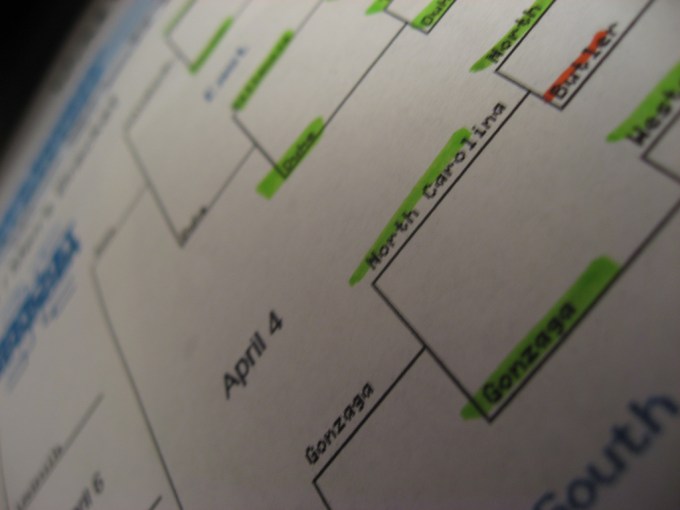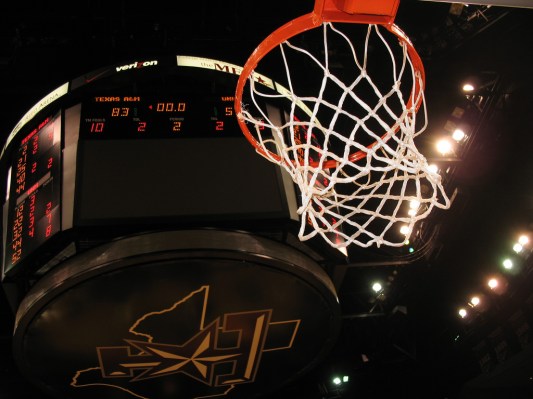Every March a sacred ritual is reënacted around the country as millions take the time to fill out their NCAA March Madness bracket.
While the majority of fans might rely on their knowledge of the game, popular sports analysts, water cooler talk and a gut feeling, machine learning scientists are building a predictor tool to help the masses complete the ultimate bracket and win a few bucks from the office pool.
For the 2016 March Madness tournament, Microsoft Bing and NCAA are partnering up once again to bring fans their smarter bracket, powered by Bing Predicts.
The Bing Predictor tool is the foundation for the smarter bracket which has been used to pick winners for popular events such as the Oscars and Grammy awards.
Walter Sun, principal applied science manager at Microsoft Bing Predicts, who has a Ph.D. in statistical signal processing, said their model yielded over 90 percent accuracy in predicting who would be eliminated on various reality TV shows.
“The Predictor tool [picked] 20 out of 22 winners for the Grammy awards and 8 out of 10 for the Oscars,” Sun said.
Sun explained that part of their approach to big data inputs includes adding in “The Wisdom of the Crowd” – the idea that collective opinions of a group converge on the correct answer more so than one individual’s answer – and identifying patterns, correlations and signals within those data points.
Looking under the hood at the engine driving the Predictor tool, a user would find intelligent machine learning technology that pulls in consumer-oriented data, such as search data and social media activity, to “find signals that correlate how people will vote. This kind of information is very valuable in terms of driving signals that might not be easily available to the general public,” Sun said.
Everything from tweets expressing consumer sentiments to websites receiving large amounts of traffic about a certain contestant is pushed through the algorithms in the model to arrive at a prediction.
“We can quantify those experiences and opinions. We get the information anonymized and aggregated – that makes it very valuable,” Sun said.
When it comes to the smart bracket, the Bing team said there are over nine quintillion possible outcomes for all 67 tournament games in the men’s division.

NCAA bracket 2009. Photo courtesy of Flickr/GoonSquadSarah.
To crunch through that data, Sun said the preliminary Predictor model is used and will crawl the web for fan sentiments and traffic around the teams, then they add in layers of historical data to arrive at their predictions.
For example, “the model can calculate how many positive or negative tweets were about a team and queries going to pages, [then] merge everything into our algorithm. If there is a boost in search for a team, we [also] include those factors,” he said.
With this partnership, the NCAA has provided Bing with over 10 years of historical team data that includes past performance, regular season data, win/loss records, strength of schedule, quality of player, high school recruiting information, staff and coaching. Subtle factors such as raw talent of the team, travel time and general athleticism of a team are also included, Sun said.
According to the Bing team, last year their smart bracket yielded 73 percent accuracy for the men’s and 79 percent for the women’s tournament, and finished in the top 30 percent of all brackets created nationwide, outpacing Google, Facebook and Sports Illustrated brackets.
Another reason for its accuracy is that the model is designed to reflect the game of today and adjusts for any changes in league rules. For example, in June 2015 when the NCAA made major rule changes for the men’s division which included shortening the shot clock from 35 to 30 seconds, fewer timeouts and stricter enforcement for resumption of play following a timeout. Sun said they made adjustments in the model to favor teams who play at a higher tempo.
“Machine learning models work best when they can best simulate the game of today from the information they learn,” Sun said.
With any tournament, fans know there will be huge upsets and unexpected injuries that will screw up the bracket. The Bing team released their complete bracket for fans to use as a guide, then as the tournament progresses, the scientists will update the smarter bracket with new predictions.
“Unlike reality shows where [we] can get highly estimated correlated signals, in sports, anything can happen,” Sun said. “Most people only follow five teams heavily, and it’s our goal to give you guidance for the other teams, and help you get a good score with your office pool.”
Sun’s advice for bracket enthusiasts is to “make sure you are judicious in your upset picks…our model can help guide you and give you an edge.”
